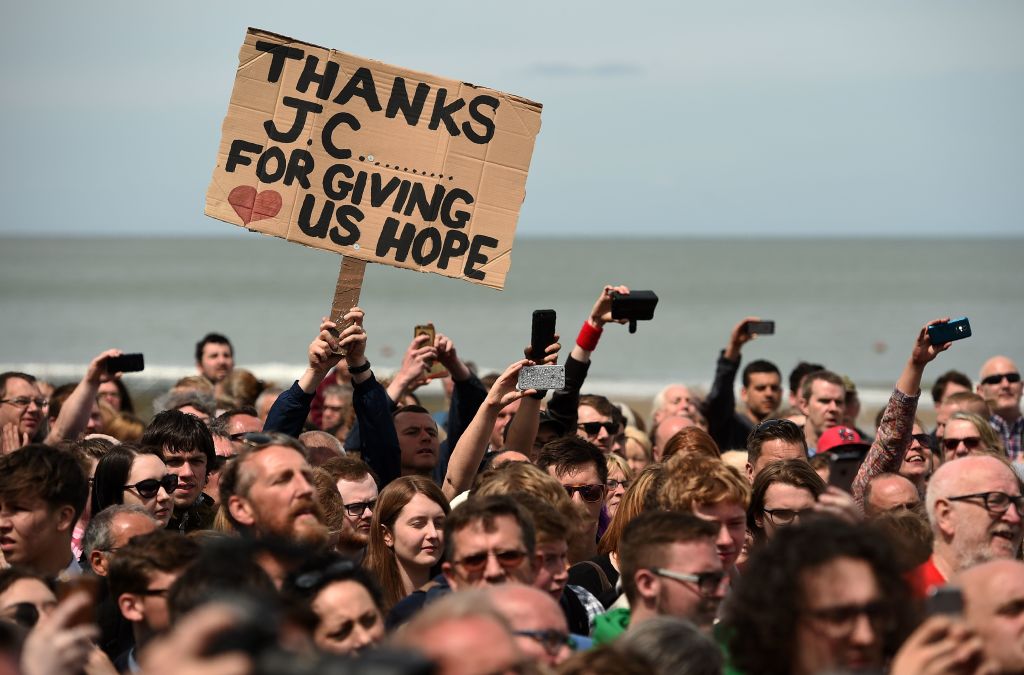The laughing should stop, says the Sun, which calls Corbynism a ‘joke’ which ‘simply isn’t funny any more’. The Labour leader has now said himself that he could be PM within six months. If he does make it to Downing Street, ‘terrifyingly, says the Sun, Trident could be gone’. And in just a few days ‘Corbyn would leave Britain open to attack’. A Corbyn government would also be ‘financially ruinous, militarily empty and so confused on Brexit and immigration that his own party contradicts itself at every turn’. After Corbyn’s rapturous reception over the weekend at Glastonbury, ‘let’s hope’ says the Sun, that the ‘enthusiasm’ for Corbyn ‘remains in a Somerset field’.
Part of Corbyn’s growing appeal stems from the government’s own woes and the Conservative party’s quandary about what to do next. To make matters trickier, the looming task of Brexit is underway. But the government should not be afraid of managing the prospect of Britain’s departure from the EU, argues the Daily Telegraph. Instead, spelling out the small print of the Brexit deal – as the government will do today with its offer to EU citizens after Brexit – allows for ‘an opportunity, a moment of catharsis even’, according to the paper. ‘Concentrating on the detail,’ says the Telegraph, will give ministers the chance to show that (the government) is on top of the task at hand’. Helpfully for the Tories, this will also take the spotlight away ’from the talk of crisis and leadership challenge which has dominated the past fortnight’. There might be ‘no escaping’ from just how ‘disastrous’ the last few weeks have been for the the PM and her party. But the Telegraph says that in the absence of a ‘quick route back’, the Government’s best option is to ‘simply get on with governing’.
As the Government publishes its plan for dealing with the question of EU citizens’ rights in Britain after Brexit, the FT says ‘this is one of the thorniest issues to be resolved in the Brexit negotiations’. The paper says that ‘there are numerous complex scenarios to be tackled’ – including healthcare and benefit rights. But the most vital part is in ‘building trust’, says the FT – particularly ‘given that Britain’s approach to date has been lacking’. The EU will be ‘looking for reassurance that the UK government is taking a broad and open-minded attitude’ and the PM ‘must show that there will be no discrimination towards EU citizens’. If the PM makes a good offer, says the FT, Brussels should be willing to ‘compromise’ too, the paper says. After all, both sides need to remember that the main ‘motivation’ in Brexit talks shoud be ‘goodwill and compassion’. So far, for the many EU citizens living in Britain, there has been ‘too much uncertainty’. But as the politicians thrash out the start of a deal, they should know that their agreement – or lack of – ‘has direct consequences for millions of livelihoods in the UK’ .
Meanwhile, the Times says the Grenfell Tower blaze ‘has revealed a massive failure of regulation and safety standards’. Since the devastating fire, in which 79 people are thought to have died, tests have been carried out on dozens of tower blocks: ‘The results are appalling,’ says the Times, which says it is clear that ‘all across Britain, hundreds of thousands of people, are living in potential death traps.’ The paper says the urgent task now is making sure these people are safe. But there also ‘loom more fundamental challenges’. One is ‘regulatory’, argues the Times, which asks a simple question: ‘How is it possible that every cladding refurbishment has now failed a fire inspection?’. More broadly, ‘there is also the issue of tower blocks themselves’. Are high-rise blocks really the answer any more? The devastating fire in North Kensington shows up ‘a toxic social alienation in Britain’s inner cities’, concludes the Times. It has also exposed ‘scandal after scandal of sloppy work, poor regulation and a bureaucracy unresponsive to warnings and complaints’. To get to grips with making sure it never happens again, the government must treat matters ’almost as a war campaign’. After all, ‘nothing matters more than living in safety.’







Comments